Ways we Used Blockchain in App Development
February 08, 2023 • 326 Views • 26 min read
Tetiana Stoyko
CTO & Co-Founder
It may seem, that blockchain network fields are not the most popular and effective field for investments at the moment.
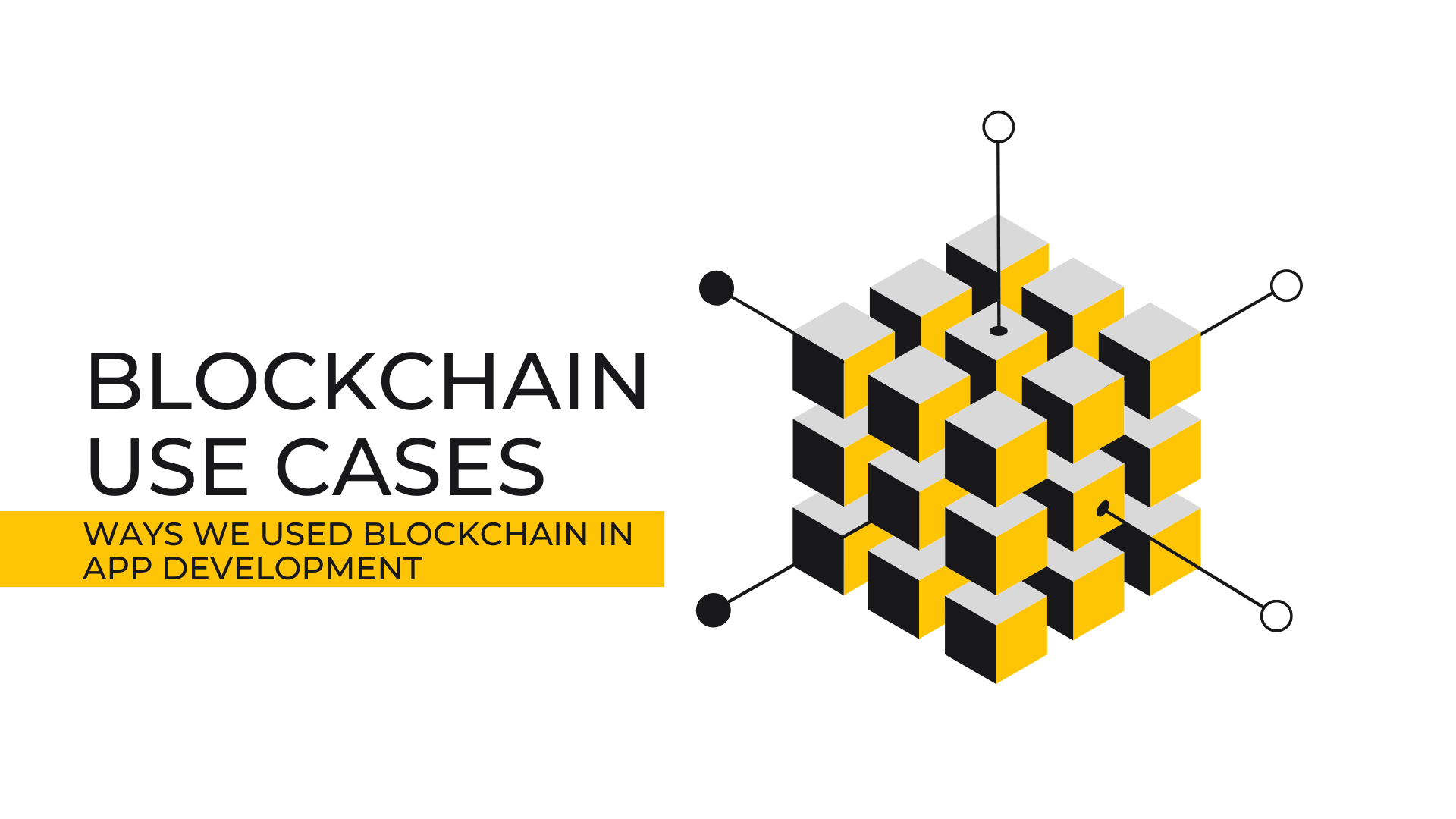
There are at least a few possible arguments for such judgment. For instance, the cryptocurrency market is too unpredictable and is showing an impairment of digital assets like Bitcoin and Ethereum.
Moreover, each cryptocurrency has its own ecosystem. Bitcoin blockchain involves not only transaction fees for transferring crypto assets but the process of their generation as well. In this case, we are talking about Bitcoin mining.
Combined with the fact, that entire blockchain technology is commonly confused with cryptocurrency and including that most blockchain project investors have their crypto assets as well, we can easily find out the reasons for a lower level of trading in these blockchain-based fields.
Still, it is worth mentioning, that this technology is not equal to Cryptocurrency and vice versa, even though they are very relative and interconnected.
As a matter of fact, there are numerous blockchain use cases, which greatly illustrate new usage for this emerging technology.
What Is The Difference Between Bitcoin and Blockchain?
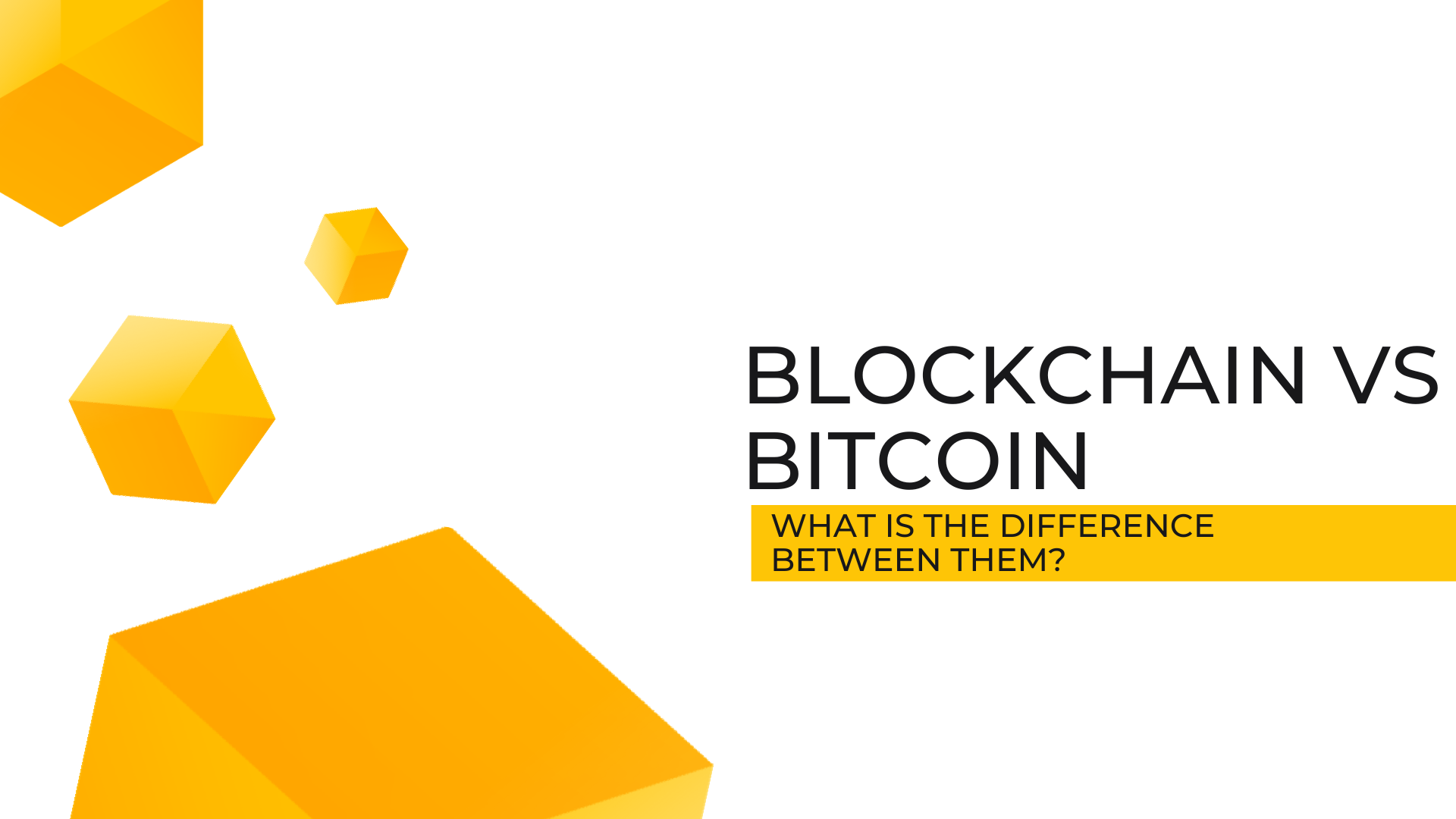
Bitcoins and blockchains might seem confusing but they are not exactly the same. During Bitcoin's development, people accidentally started to refer to Bitcoin as a cryptic network, which caused this misleading term. Blockchain technology is largely a non-cryptographic technology other than Bitcoin. Bitcoin is a digital currency with no central control. Bitcoins were originally intended to be used for online banking but now have an online currency that can be exchanged in cryptocurrencies or USD. The Bitcoin Blockchain is managed through a public blockchain network.
Bitcoin Network
A public ledger identifies every Bitcoin transaction and servers in many countries have copies in their systems. These servers look like bank systems. While banks are primarily interested in the transactions their customers exchange, the Bitcoin server is familiar with every Bitcoin exchange in the world. Any computers that have spares can use them as nodes. You could even have opened a Bitcoin bank. This is why it is also known as a public blockchain network.
Yet, Bitcoin blockchain is just one of the possible blockchain technology examples, i.e. there are other cryptocurrency-driven solutions like Ethereum.
Blockchain in Money Transfer
To add some more about the capabilities of using Blockchain technology for money transfer, we can easily turn to statistics and well-known facts.
Powered by cryptocurrency, blockchain technology is expected to grow exponentially in popularity in the few next years. According to Finder's blockchain statistics 2023 report, worldwide spending on various blockchain technology solutions is expected to grow up to 19 billion US Dollars in 2024. Comparing this number with the one from 2021 - 6.6 billion US dollars, it is possible to say, that the annual investment from various actors is more than surprising and promising.
Blockchain technology has become increasingly important because of its cost savings in banking and finance. Blockchain technology can help banks save money by eliminating unnecessary paperwork and enabling a more efficient ledger. These companies and institutions can utilize blockchains to allow efficient transfer and exchange of information between customers.
If we go back to the Bitcoin bank example, then such an institution will be limited to a single currency - Bitcoin. Yet, if we decide to implement blockchain technology into financial institutions like banks, then it will play a role in the infrastructure, not as an asset for further exchange or sale, even though various cryptocurrencies can, and most likely will be used as an alternative payment method.
Additionally, in the context of potential blockchain integrations and their possible role within different institutions, there is a wide range of different useful tools and software solutions, as well as a variety of companies, specializing in analyzing and recording transactions, making the cryptocurrency market more predictable and investor-friendly.
For instance, Chainanalysis helps financial institutions track cryptocurrency exchanges and investigate blockchain activity. So, what actually blockchain is, and how to successfully implement it in your business network, regardless of the software industries it belongs to?
Briefly About Blockchain Platform
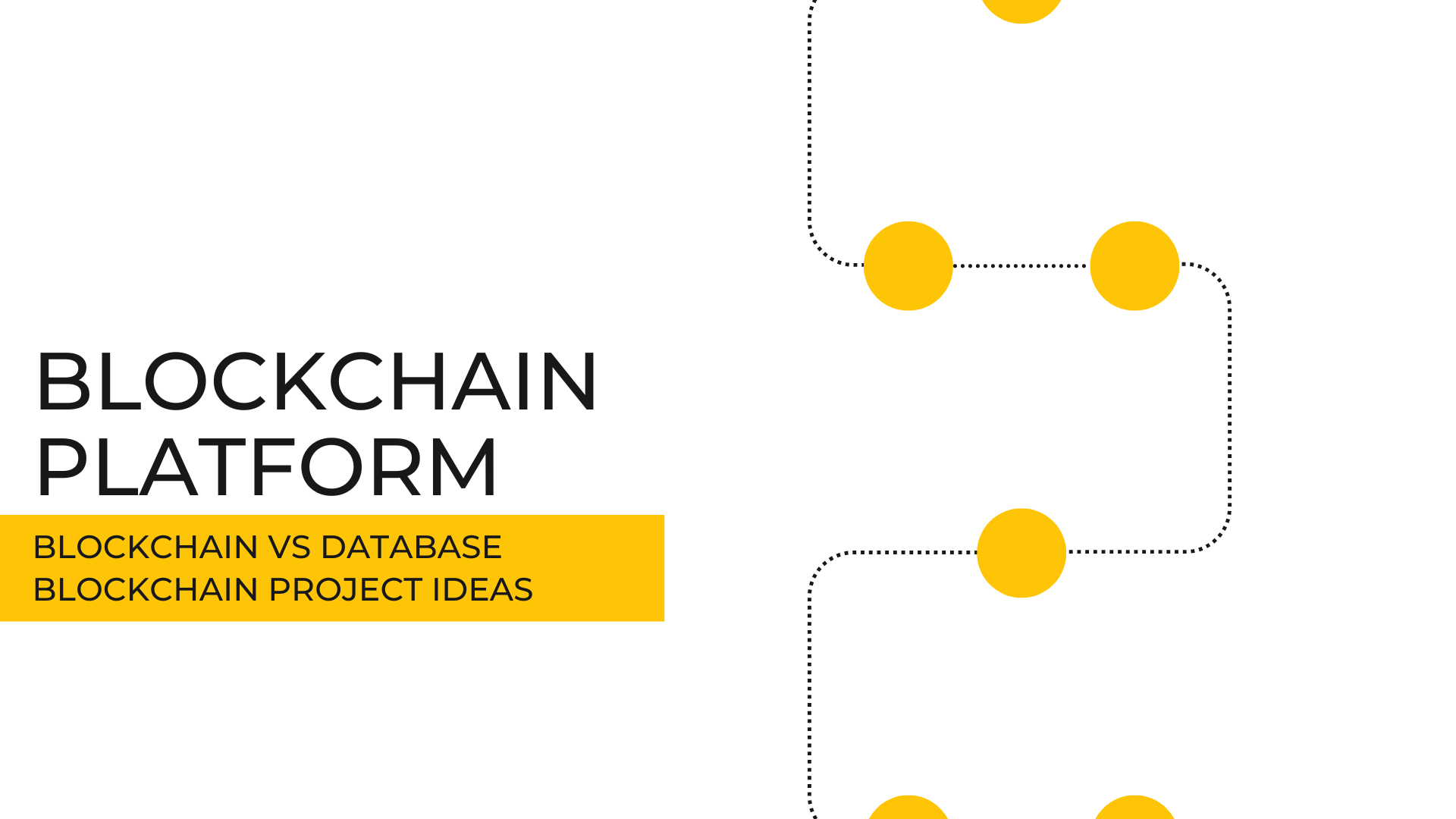
First, let’s figure out what this is, what is so special about blockchain use cases and what is the reason to use blockchain technology.
The main feature of this tech is that it is mainly used for data transferring. Therefore, blockchain stands for “block” and “chain”, meaning that the data is stored in blocks and the blockchain transaction of such data block is performed in a chain, helping to avoid data breaches and secure data transparency.
Moreover, the blocks within the chain are interconnected, and it is one of the security solutions. So it is much more difficult to intercept an individual block or replace it with an unauthorized one, which positively affects data security and proposes the transaction record feature, helping to track each transaction and analyze it.
Frankly, originally this solution appeared as a software solution for the cryptocurrency industry and was used to transfer large amounts of data, related to various transactions.
Thus, it was one of the most important security tools, which helped to ensure a high level of anonymity and safety of each transaction at the same time.
Still, probably each blockchain developer from any industry paid attention to immutable ledger technology and found new uses for it, adapting to the needs of different fields like Healthcare, Logistics, using it for creating smart contracts, etc.
As a result, nowadays, blockchain use cases are not limited to a single sphere. Instead, blockchain applications have numerous use cases, and it is hard to tell exactly which industry it is related to. Yet, the never-ending blockchain statistics show the problem of not understanding this technology.
For instance, most regular users still consider it as a part of cryptocurrency. At the same time, developers are constantly experimenting with it, trying to find out how to implement blockchain technology into new software projects.
What Is The Difference Between a Blockchain Network and a Traditional Database?
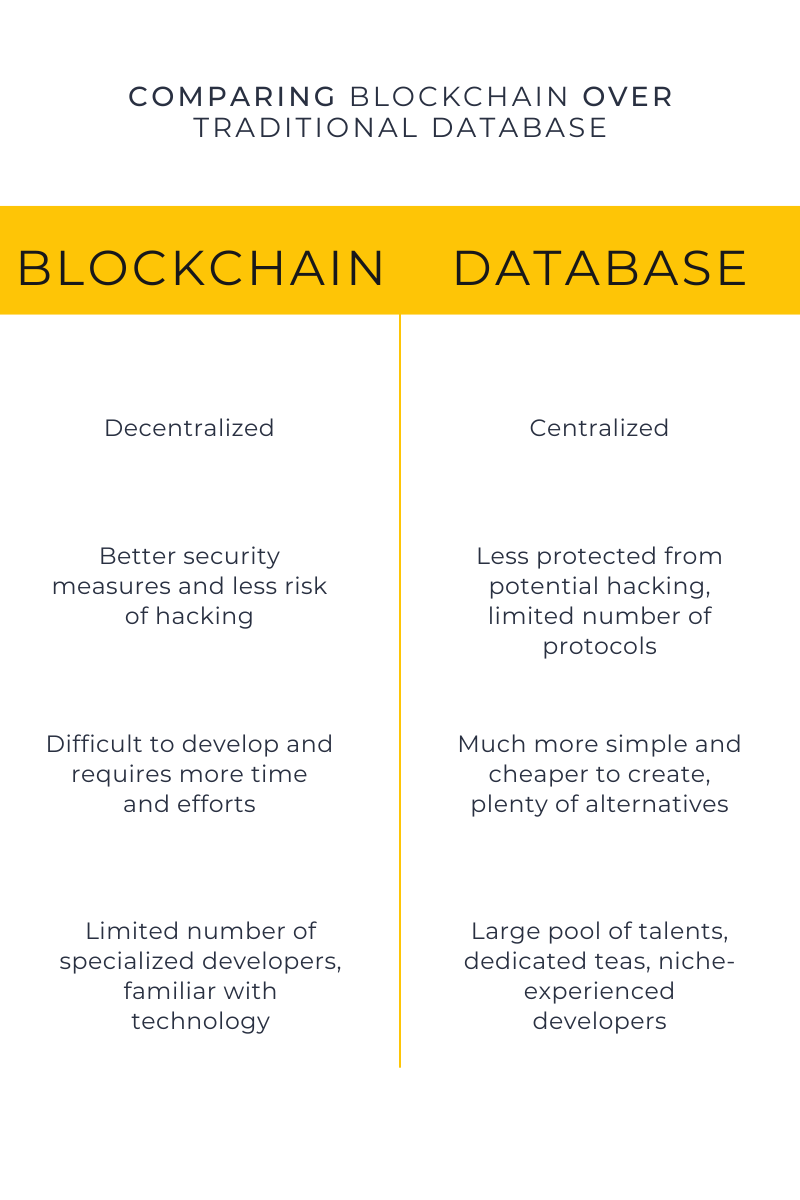
As was mentioned before, blockchain works with data blocks, securing their transferring and storing. Thus, it is possible to assume, that it is a variation of a traditional database. However, it is not a totally correct statement.
Databases and blockchains differ significantly from one another. Databases are central while blockchains are decentralized. Integrated databases are quicker, cheaper, and more efficient. Because of its distributional nature, blockchains have better security and less risk of hacking. Because blockchains are open ledgers, they're able to provide more information transparency.
Blockchain technology costs much more to run than traditional hardware. Private and public blockchains are often used for remote applications. Decentralized applications require blockchain. Hacking blockchains takes a much longer time and requires more effort.
Clearly, the appearance of blockchain technology doesn't mean, that traditional databases are going to become extinct. Summing up all the above, we can conclude that each of them has its own pros and cons, and should be used in the context of the application.
Despite the number of innovations, brought by blockchain technology, it is worth understanding, that it is not an all-in-one solution, even if it can be successfully integrated in most modern industries. Thus, we would like to give you a few examples of technology solutions, and how we build blockchain applications, which are not always related to the virtual currency market.
Possible Blockchain Project Ideas
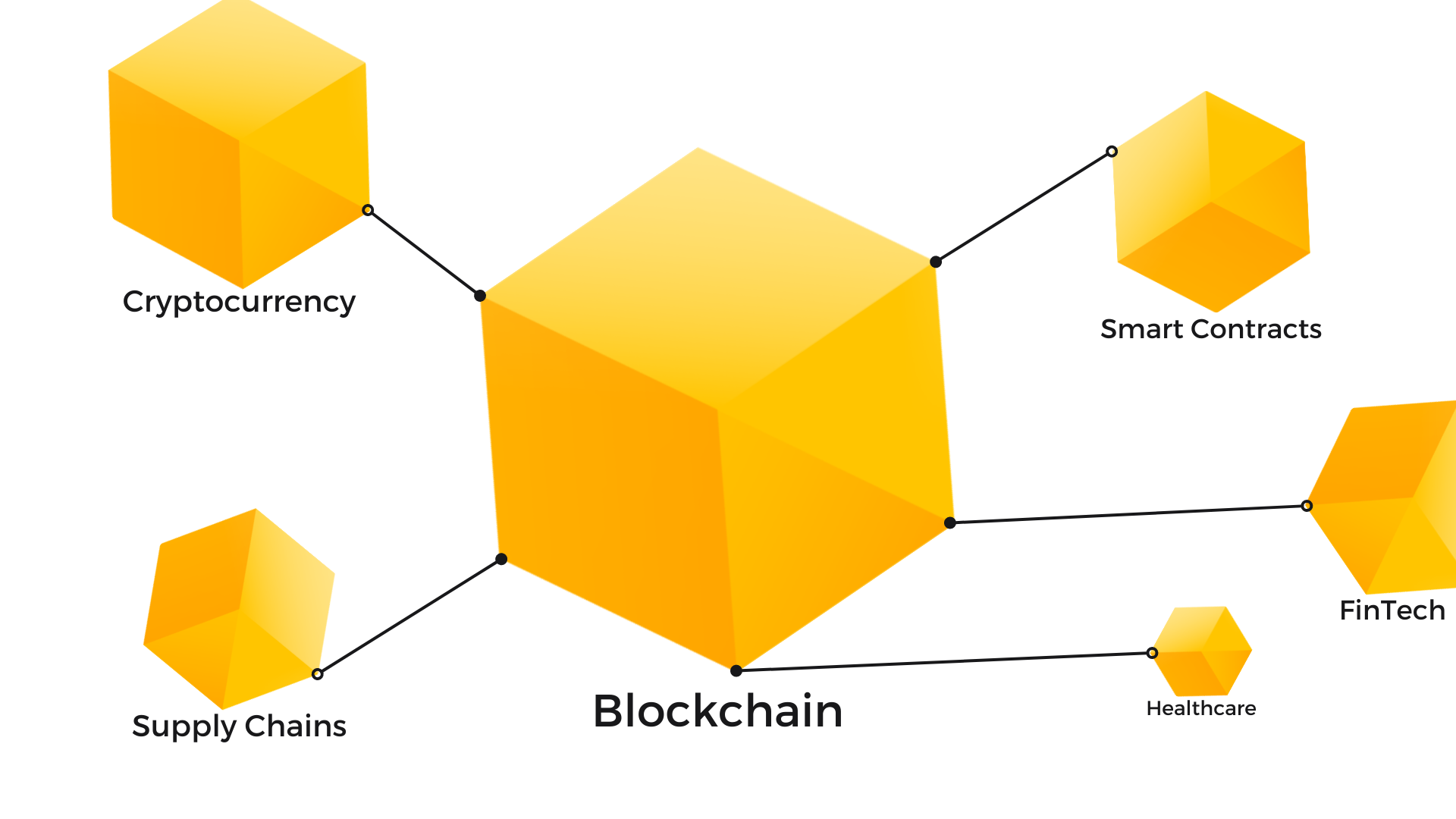
As we mentioned before, it is primarily a way of transferring data or storing it to maintain data integrity. Therefore, the most suited conditions for blockchain integrations are the ones, where you will have to somehow deal with data storage operations.
On the one hand, probably each software product is based on data transferring, so it seems that there are no limitations for blockchain distributed ledger technology.
On the flip side, such an approach to data transferring is very specific and much more complex than usual transfers. It also requires more resources and time, depending on how scalable the transaction is.
Summing up all the above, it would be fair to assume, that before thinking about how to implement blockchain technology into your app, it is better to consider whether you need this software in your application.
To rephrase it, it is worth remembering, that it can not only improve the overall security of your project, bringing multiple benefits, but will result in numerous drawbacks and issues to deal with.
Fortunately, there is a list of alternative blockchain integrations, which has already shown their effectiveness. One of the most appreciated features of blockchain, apart from its high security, is the fact, that any change is saved in the log.
So, supervisors can easily find any adjustments or transformations of the data. This creates a unique and transparent method of managing an array of data.
Blockchain for Media and Entertainment
Thanks to the control over all the data, as well as the possibility to track different changes, and approve new entries by a voting process, blockchain technology can become a very important instrument for most industries, which are specialized in working with content. One such example is Media and Entertainment field.
Companies can use blockchain technology to control copyright. Copyright validation is vital in determining fair compensation and preventing identity theft. It involves multiple transactions for recording sales of copied material or transferring copies thereof. Sony's music industry uses blockchains for digital rights management. They’ve successfully implemented blockchain technology in copyright processing to increase productivity.
Alternatively, there are NFT apps, which allow users and content creators to mark their intellectual property by melting it with various crypto coins. As a result, there will be only one original digital version of a work of art, or other content fragments.
Private Transactions
It is probably the most common and well-known use case of any blockchain network. Due to the fact, that blockchain appeared as a software solution and infrastructure for cryptocurrency operations.
As a matter of fact, there are numerous ways and ideas on how to implement private transactions within most modern applications or other projects. For instance, despite that it is not a 100% innovative way to use blockchain technology for payments, it still doesn't mean, that it is a bad idea to develop a blockchain project for Peer-to-Peer payments and financial transactions.
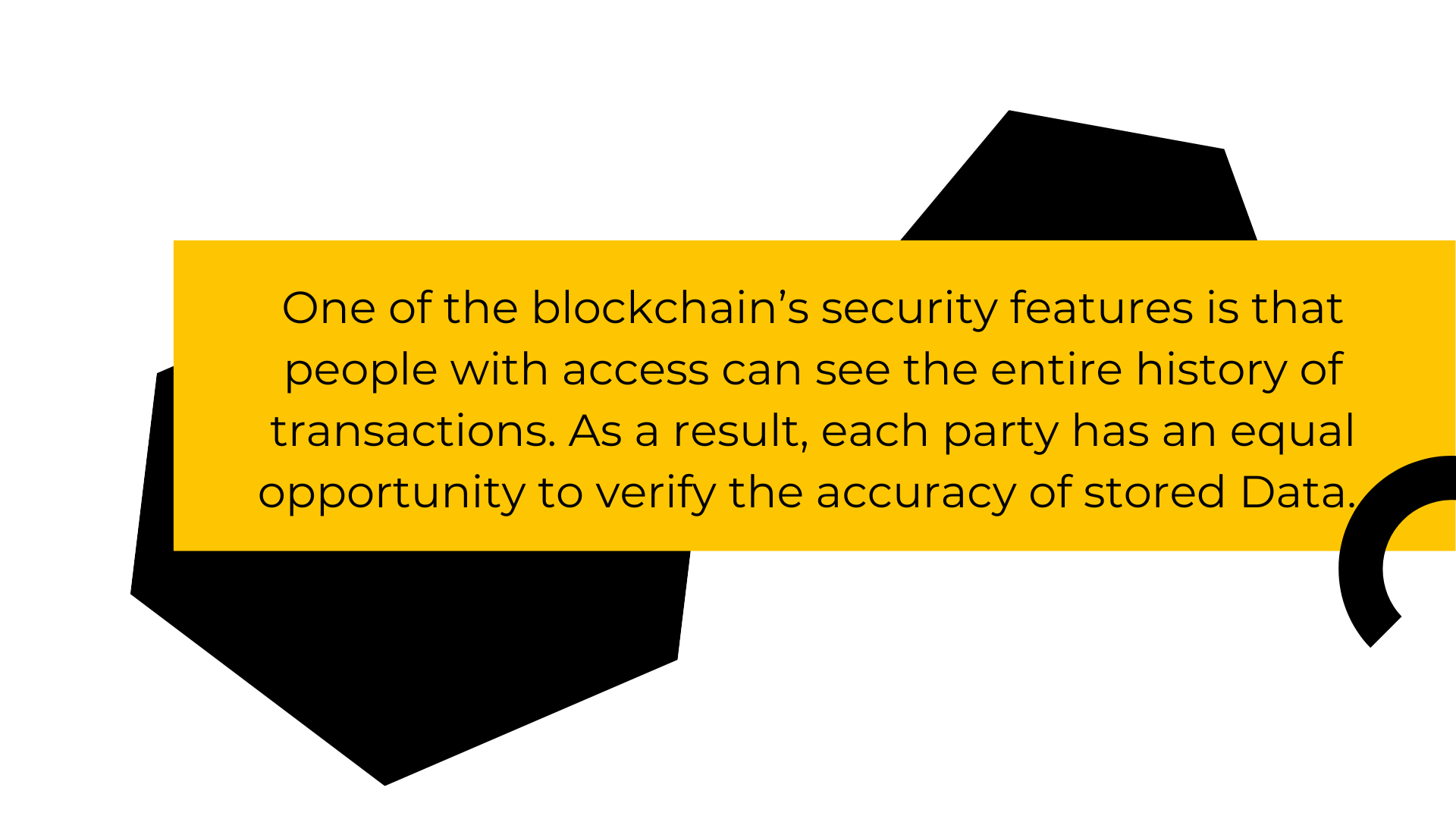
Some blockchain networks are classified in the form of publicly accessible information which enables anyone with internet access to the transaction records of the networks' transactions. Although a user can read the Transaction Details, the information is unavailable to the user executing the Transaction.
As a result, such transactions are both transparent and private, giving a chance for the rest to track most transfers of various cryptocurrencies, still having no exact details or information on those, who are taking part in the transaction. For instance, Bitcoin, as one of the mainstream currencies, is largely unidentifiable pseudonymous and has no visible address.
Talking about the possible solutions for using Blockchain in a more revolutionary way, we can propose to consider mobile development, i.e. to create a mobile app, which will allow fast P2P transactions, just like in the case of PayPal, yet instead of using traditional currency to switch to crypto coins.
Supply Chains as Blockchain Projects
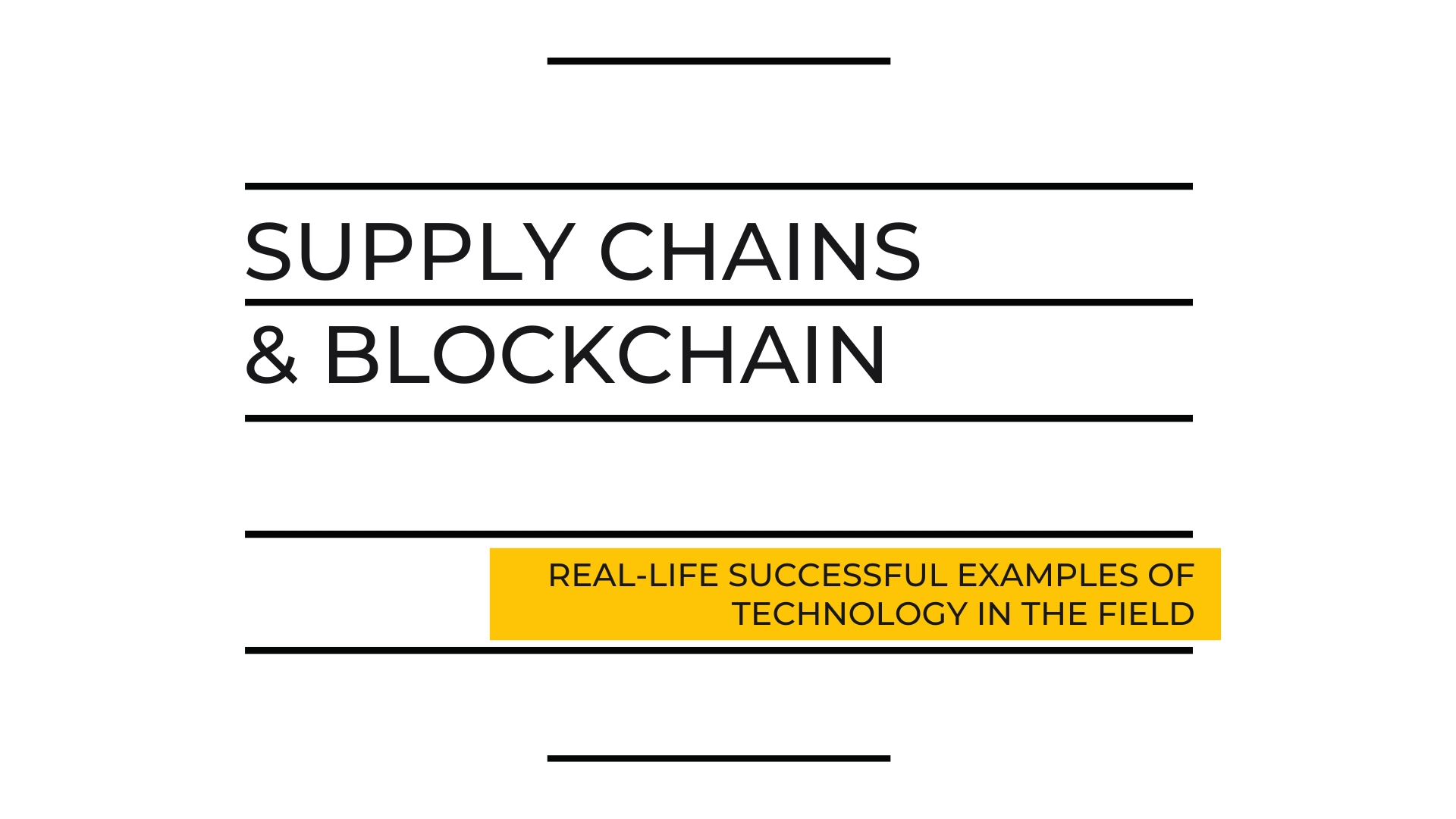
As for now, there is a wide range of embodied blockchain projects in the field of Logistics and supply chain management. Actually, it is one of the most competing industries, somehow related to decentralized networks, for now.
Different companies are trying to improve their product with the use of various tools. Decentralized applications are not an exclusion. Consequently, giant corporations, experienced in Blockchain development have proposed their services.
For example, the recent Walmart blockchain case, a supply chain, designed to improve the overall quality of the products, distributed from all around the world.
However, giant IT companies are not the only ones, that are trying to gain a foothold in a new market. Such blockchain projects like VeChain and Bext360 were created by newcomers, becoming one of the most well-known examples of technology in this field.
Examples of Technology: Smart Contracts
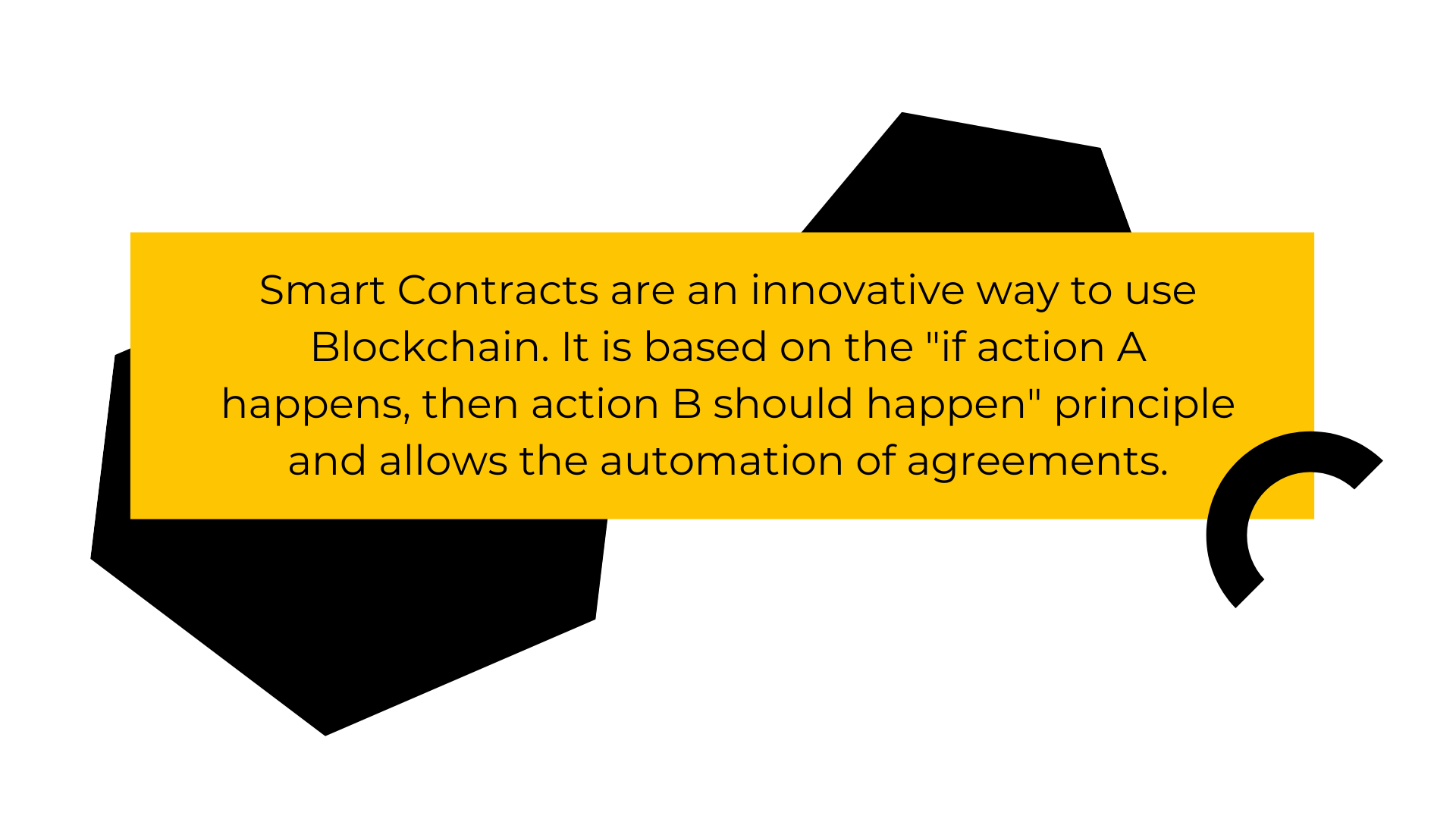
One of the most famous and spread examples of alternative blockchain implementations is to build smart contracts. The main feature of such apps is based on one of the previously mentioned decentralized ledger features.
To cut a long story short, smart contracts are using an “if action A happens, then action B should happen” architecture. In other words, developers are setting up the main statements or requirements to achieve.
Then, both sides write Ethereum smart contracts, which gain access to the progress of development. As soon as any of the statements proceed, the software executes the related action.
Therefore, it becomes possible to create self-executed, fully-automated agreements and other documentation. This sounds like a great relief for many people.
Still, it is worth mentioning, that despite the fact, that there are at least a few successful examples of smart contract development, all these agreements are not recognized by law, i.e. none of these smart contracts is authorized no the legal level.
As for now, they are rather a useful additional tool, than full-fledged legal agreements. So, even if you are setting your agreement, using smart contracts, it is better to create also old-fashioned documentation just in case.
Blockchain Integration Use Cases: Sensitive Data Transferring and Storing
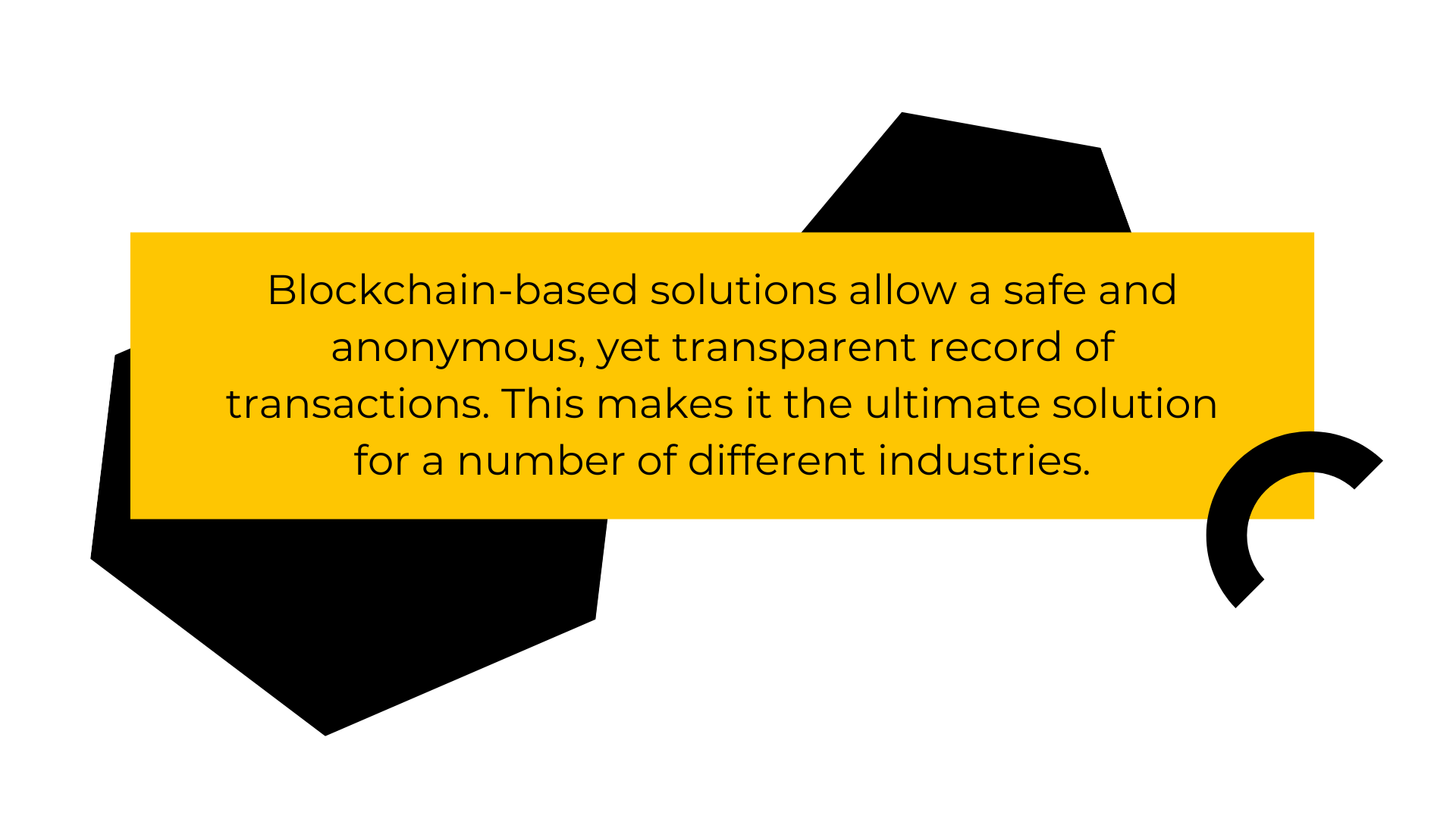
Eventually, it is a great idea to use blockchain tech for transferring sensitive data like personal files or medical data via private blockchain networks. For instance, blockchain system can be easily implemented into Healthcare applications or used in other industries, which include working with other personal data, like eCommerce and FinTech.
Blockchain based solutions allow a safe and anonymous, yet transparent record of transactions. Thus, you can share patient data or other medical records like clinical trials between various mApps with the use of blockchain protocol.
Anyway, it is hard to predict such usage for now, including the existence of various regulations like GDPR and the need of signing a DPA agreement for sharing such vulnerable information between various companies and third parties.
Our Experience With Private Blockchain Networks
Frankly speaking, the private blockchain network market has grown and improved so much, that today even outsourced companies can successfully develop blockchain solutions, regarding the requirements of the clients. At the very beginning, such examples of technology implementations were mainly very confidential cases.
To make it clear, just as in the case of custodial and non-custodial crypto wallets, the security of private keys is an essential part of developing any blockchain. However, today there are plenty of regulations and types of agreements, which help to better manage the access levels and overall safety of the whole structure.
This is why it becomes easier to define security risks and set up correct agreements between both sides. Dedicated teams are more often involved in software projects, somehow related to the field of blockchain and digital currency. Incora is not an exception.
For example, blockchain application development involves creating various applications, which involved also web development and blockchain application development. Thus, we would like to share some thoughts in this field as an illustration of blockchain capabilities.
DeepDao Blockchain Technology Application
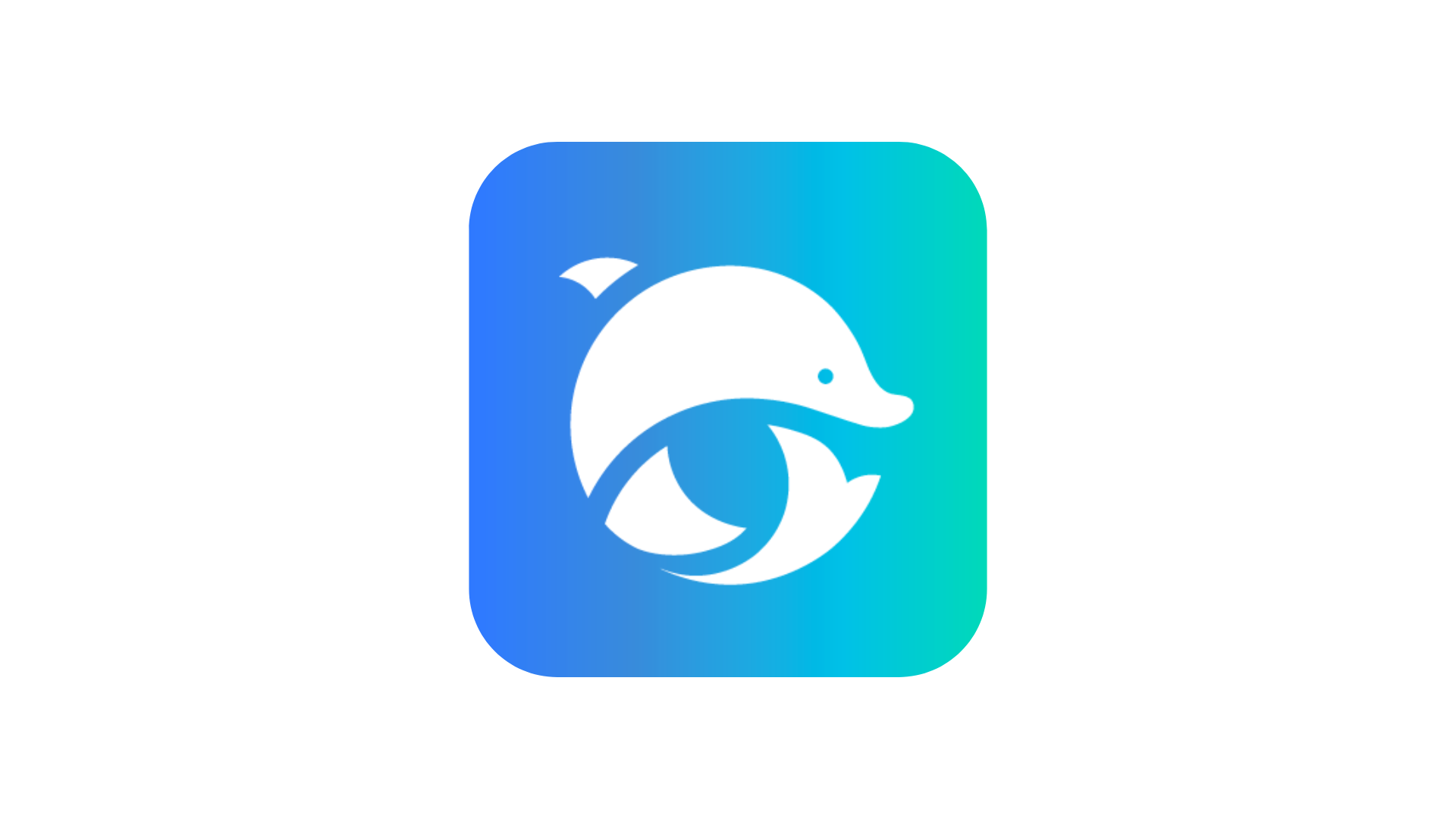
It is probably the first thing that comes to mind. DeepDao is a decentralized finance (DeFi) application, used to track and monitor the actual situation in the field of decentralized autonomous organizations (DAOs).
During the development, we took part in the optimization of the platform itself, as well as adjusting the internal blockchain database processes like data gathering and storing. DAO itself is also another great example of blockchain use cases.
To put it in a nutshell, these are organizations with horizontal management hierarchies, where each member has an equal right to make decisions.
Even though we barely touched the blockchain development, Incora’s DeepDao case was a unique combination of multiple technologies and unordinary solutions, where we had to manage big data from APIs.
As a result, we learned a very important lesson: when you are dealing with blockchain-related applications, and even if you are not working with this technology directly, you still have to have at least basic background knowledge about it.
Smart Contracts Use Case
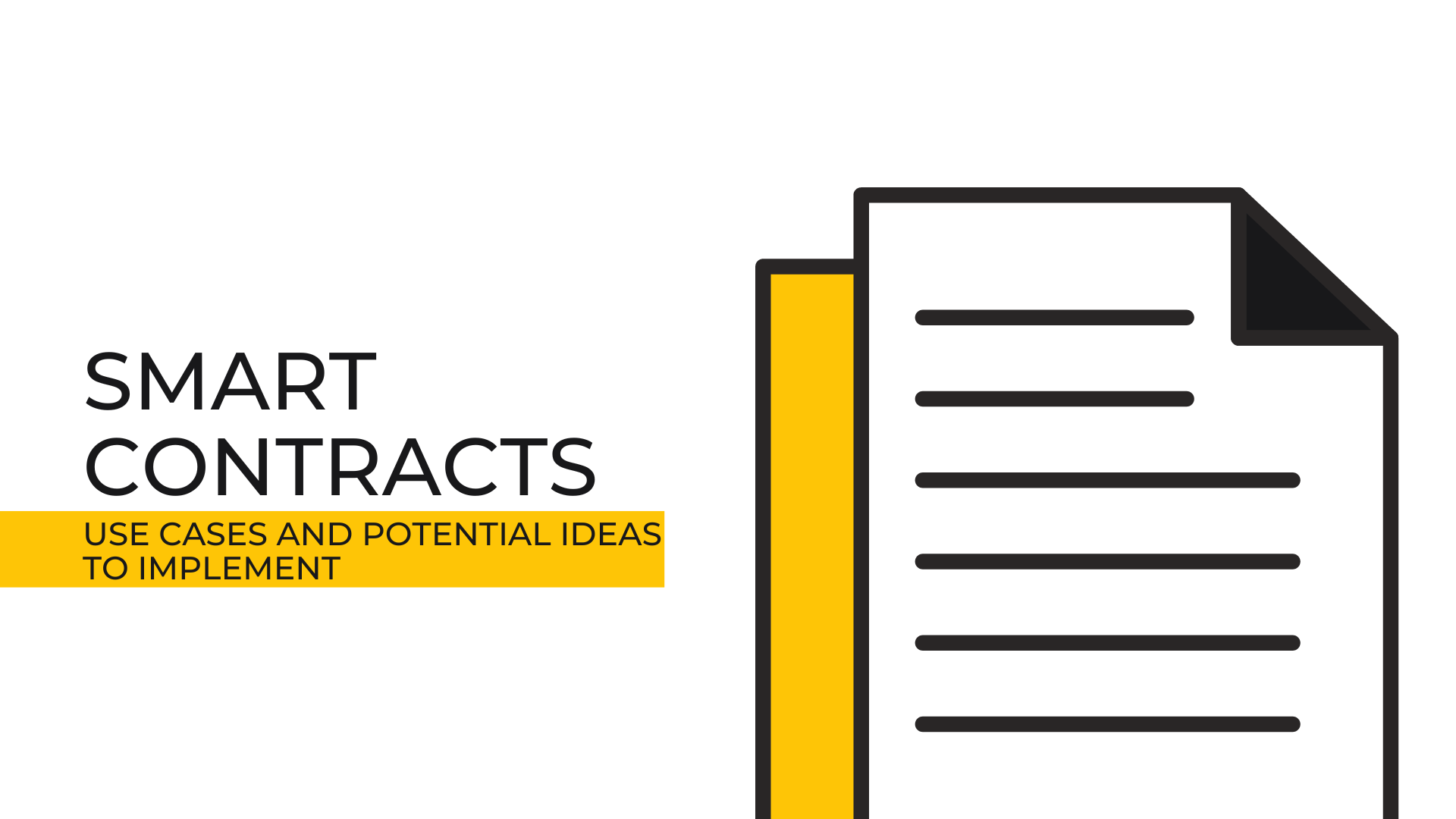
One of our most recent blockchain projects was an application, designed to make the process of smart contracts establishing more user-friendly. In this case, we had to dive into the blockchain specifics and took an active part in their implementation.
Within this project, we managed to help in the designing and development of a few various features at once. For instance, apart from integrating the smart contracts feature within the platform, we also helped with setting up some other functionalities.
Truth be told, smart contracts are not the only specification of this platform. Mainly, it is targeted at supply chains, and smart contacts are only one of the proposed features.
As a result, we were involved in the development of various functional components, most of which were directly linked to the digital ledger.
Private Blockchain Ledger
Eventually, we also participated in the development of cryptocurrency platforms for financial transactions as well. Contrary to the previous cases, this time we had a chance to work with the blockchain-related aspects more closely.
At first, we helped to develop a custodial wallet, which should have been the main basis for all further features. However, after we did so, and developed the main custodial wallet, the clients decided to switch to the non-custodial ledger after some time.
Plainly speaking, this case was a complex one. Building a wallet itself, as well as correctly setting it up and connecting with other services is not an easy task.
Is it worth mentioning, that when it comes to changing the overall application logic and changing most working functional components, the working process becomes even more difficult and complex?
End Line
Based on our experience in this field, we can say that the list of options on how to implement blockchain technology into your app and what to do with it is already surprisingly big. To add some more, we are sure that the variety of these options will only grow over time.

Nevertheless, before trying to implement blockchain solutions in your software project, try to decide whether you need them or not. Try to figure out what pros and cons to adopt blockchain technology there are, and, eventually, if it is worth implementation.
To do so, you can at least check some case studies and look for other related articles on the topic.
What’s your impression after reading this?
Love it!
1
Valuable
1
Exciting
1
Unsatisfied
2
FAQ
Let us address your doubts and clarify key points from the article for better understanding.
you may also like
Let's talk!
This site uses cookies to improve your user experience. Read our Privacy Policy
Accept
Share this article